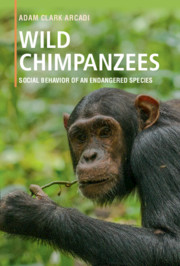Book contents
- Wild Chimpanzees
- Wild Chimpanzees
- Copyright page
- Dedication
- Contents
- Preface
- 1 Primates, Apes, and the Study of Chimpanzee Social Behavior
- 2 Seven Long-Term Field Studies
- 3 Chimpanzee Fission–Fusion Social Organization and Its Conservation Implications
- 4 Sex Differences in Ranging and Association Patterns
- 5 Female Social Relationships
- 6 Male Social Relationships
- 7 Sexual Behavior: Conflicting Strategies of Males and Females
- 8 Coalitionary Lethal Aggression between and within Communities
- 9 Hunting, Eating, and Sharing Meat
- 10 Communication: The Form and Content of Signals
- 11 Community Differences in Grooming Postures and Tool Use: Innovation, Social Learning, and the Question of “Culture”
- Epilogue
- Appendix: Field Methods for Studying Wild Chimpanzees
- End Notes
- References
- Index
- Plate Section (PDF Only)
6 - Male Social Relationships
Published online by Cambridge University Press: 01 June 2018
- Wild Chimpanzees
- Wild Chimpanzees
- Copyright page
- Dedication
- Contents
- Preface
- 1 Primates, Apes, and the Study of Chimpanzee Social Behavior
- 2 Seven Long-Term Field Studies
- 3 Chimpanzee Fission–Fusion Social Organization and Its Conservation Implications
- 4 Sex Differences in Ranging and Association Patterns
- 5 Female Social Relationships
- 6 Male Social Relationships
- 7 Sexual Behavior: Conflicting Strategies of Males and Females
- 8 Coalitionary Lethal Aggression between and within Communities
- 9 Hunting, Eating, and Sharing Meat
- 10 Communication: The Form and Content of Signals
- 11 Community Differences in Grooming Postures and Tool Use: Innovation, Social Learning, and the Question of “Culture”
- Epilogue
- Appendix: Field Methods for Studying Wild Chimpanzees
- End Notes
- References
- Index
- Plate Section (PDF Only)
Summary
OVERVIEW
The social lives of chimpanzees are influenced by how and with whom they compete for the resources necessary to their survival and reproduction. For females, this primarily means vying with other females for feeding locations within the community territory. In general, female–female competition occurs on a one-to-one basis, with individuals prevailing over or submitting to each other based on infrequent and low-level aggressive interactions. Although females are at times overtly friendly with one another and occasionally may form temporary coalitions to attack other females, on a daily basis they are largely indifferent to each other. Instead, adult females devote most of their social energy to nurturing and protecting their dependent offspring, who will forage, rest, and sleep with them for many years. Thus, female social life is characterized mainly by intensely supportive relationships with close relatives, competitive though occasionally friendly associations with other females, and deferential relationships with adult males.
Male existence, by contrast, revolves around both within- and between-community rivalry with other males for status, territory, and access to sexually receptive females. More so than for females, consequently, their social lives are shaped by a complicated mixture of competition and cooperation. On the one hand, males regularly patrol and defend territorial boundary areas together. Violent and sometimes lethal territorial aggression, in which several males from one community cooperate to attack isolated individuals from a neighboring community, has been observed at all study sites (Chapter 8). Meanwhile, the same males that join forces in dangerous territorial interactions also compete vigorously against each other for dominance status within their own communities. Although dominance conflicts are usually resolved through one-on-one aggressive interactions, they too can involve coalitions, are sometimes extremely violent, and can be lethal. Thus, relationships among males embody a delicate balancing act, with individuals committing large amounts of time to friendly interactions while also intermittently engaging in escalated aggression with each other to achieve dominance status.
Male behaviors toward females, on the other hand, are oriented more toward gaining long-term sexual access than creating supportive social bonds. Males form coalitions much less frequently with females than they do with males and, correspondingly, spend less time directing affiliative behaviors toward females. Meanwhile, despite the fact that their relative ranks are never in question, males frequently direct seemingly unprovoked aggression toward both cycling and non-cycling females.
- Type
- Chapter
- Information
- Wild ChimpanzeesSocial Behavior of an Endangered Species, pp. 48 - 56Publisher: Cambridge University PressPrint publication year: 2018



